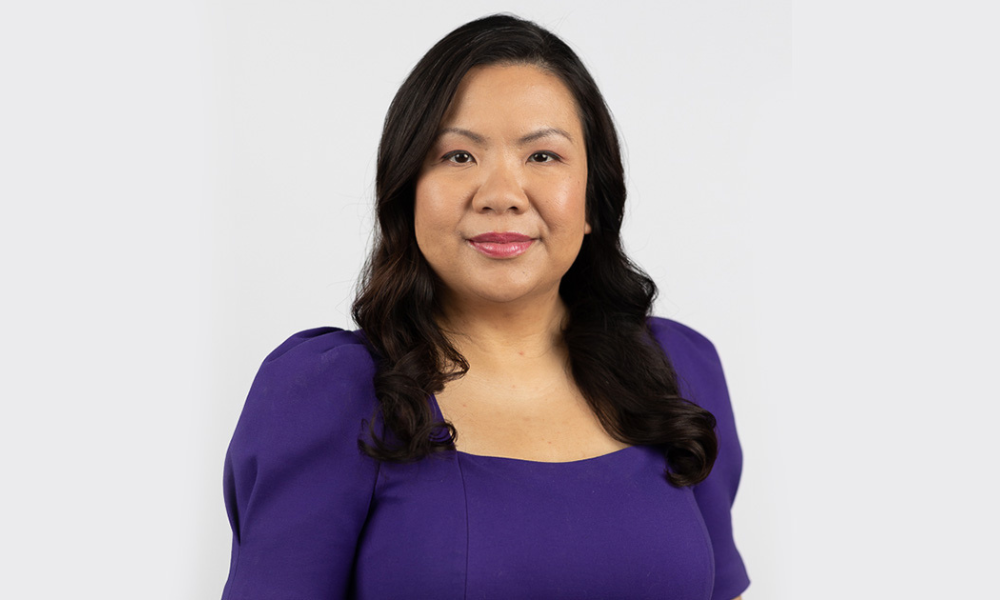'The market will humble you; you don't get to hide behind ten different reasons why something didn't work out,' says portfolio manager at SLGI

If you were to ask Christine Tan why she first got into the asset management space, she'll point to three core reasons that continue to energize her even after several years in the industry.
For one, the ever-evolving nature of financial markets is both stimulating and humbling. She thrives on the need to stay curious and informed amid a constantly shifting global landscape.
“Every time I think that we're headed into a period where things are calming down, something new happens,” said Tan, portfolio manager at Sun Life Global Investments (SLGI) pointing to everything from the global financial crisis to geopolitical tensions and now, trade wars.
As a portfolio manager, she emphasizes her work is driven by the meaningful impact her work has on clients’ futures. She sees herself as a steward of retirement assets for plan sponsors and plan members, a role she doesn’t take lightly.
“If there’s one thing I take most seriously, it’s this responsibility,” she said. “What we do will enable them to achieve financial security at some point. We also have a responsibility to not only achieve the financial outcome but improve the broader economic outlook.”
She underscores the career is “always dynamic” and there’s no point at which one can claim to have even truly mastered it. Even foundational skills like financial modeling or discounted cash flow (DCF) analysis must be continuously adapted as new asset classes, like cryptocurrency, come to the forefront. She believes it’s a multidisciplinary role that requires forming a holistic world view, especially when allocating capital globally.
“To be a portfolio manager, you also need this very integrated approach of thinking about the psychology of all-things economics,” she said. “You need to think about history. Not only history of markets, but also history of economies and history of asset classes and geopolitics. It's almost like you're trying to form this holistic view, especially when you're an asset allocator like us and deciding which part of the world that you want to invest in.”
As to why the next generation of analysts, asset managers and portfolio managers might seek a career in such a volatile landscape, she believes that many young professionals are drawn to the asset management industry, not just for the pay - which she acknowledged is competitive - but for the long-term potential and meaningful work the field offers.
“They see it as a long-term career that they can build up over time. It’s very much a career that's built on meritocracy,” she said, while highlighting traits like adaptability, humility, curiosity, and teamwork as essential for long-term success.
Tan asserted the intellectual stimulation of working with market volatility, the balance between independent analysis, team collaboration and collegial atmosphere are just a few of the best parts of being a portfolio manager, particularly the dynamic conversations that go beyond the numbers.
While developing high-conviction investment theses is part of the job, she emphasized that friendly debate and diverse perspectives among a team are critical.
"We talk about things from market issues to election outcomes. And then, of course, we're always trying to drill it down to what does it mean for the portfolio? The market will humble you; you don't get to hide behind ten different reasons why something didn't work out,” she said, adding that success depends on owning mistakes, adapting to change, and staying focused on plan sponsors.
Additionally, working with a global team helps challenge biases and foster richer decision-making.
“You want to be in a team that has a diversity of thought, because a lot of times you don't even know what you don't know,” she said, acknowledging the role personal experiences and cultural background play in shaping market perspectives.
“Being able to think independently… but also debate and work in a team is very humbling,” she added, underscoring the market holds everyone accountable – even her.
“The market is always judging me. Judging the accuracy of my analysis and my discipline.”
Ultimately, Tan finds great personal fulfillment in her work, particularly when helping clients navigate turbulent markets. It’s these moments that underscore not only the impact financial professionals can have but also maintain long-term trust through honest and transparent conversations.
“It's all part of that whole evolution of just constantly adapting yourself,” she said. “But it’s a career that can be very rewarding, and it’s a career that I find when you invest yourself, your time, your energy into it, you get a lot of it back out… Humility is so important.”
“Even today, I'm still learning. I'm still developing my communication skills and the way I look at the markets.”



